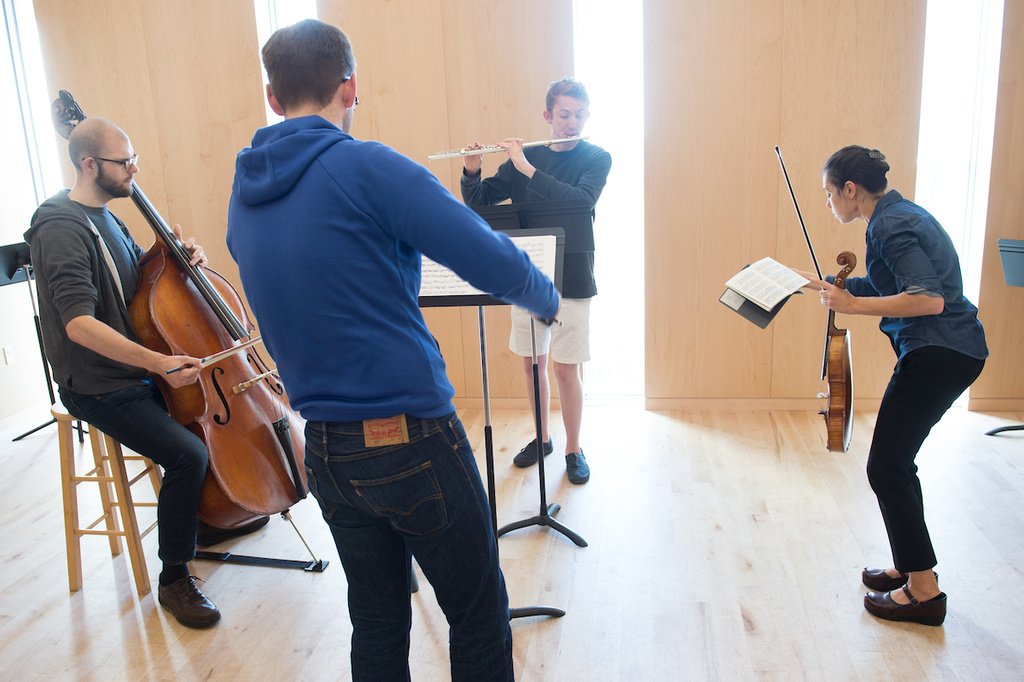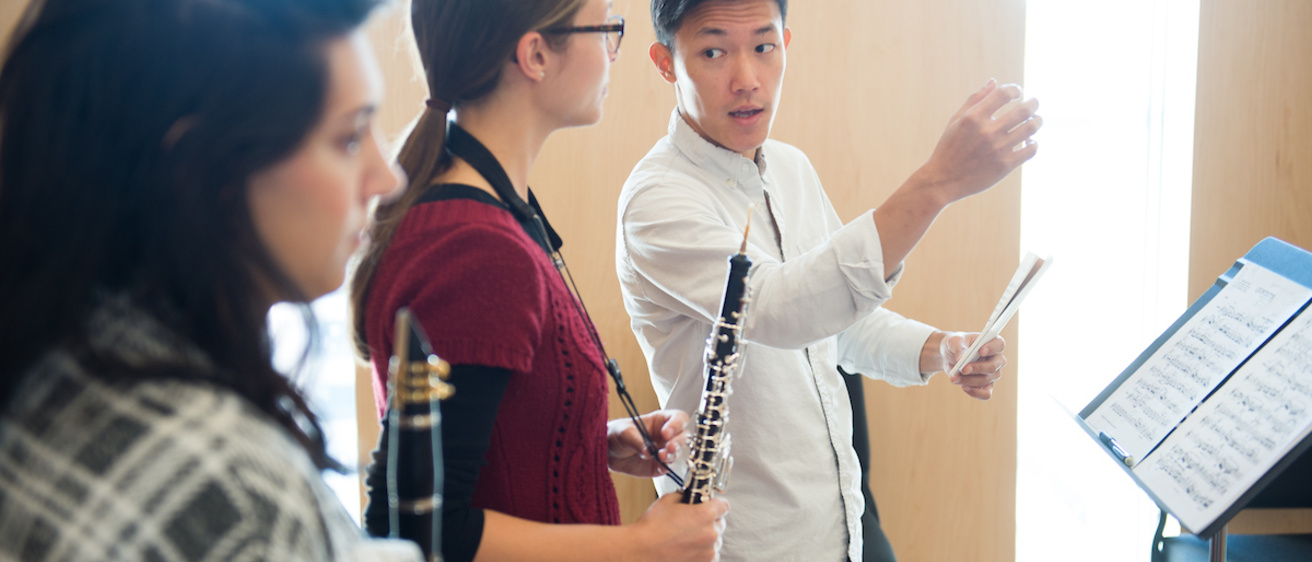University of Iowa students who take classes in dance, music, and theater not only learn from accomplished faculty members, but also from more than 200 guest artists every year, broadening their academic experience and boosting job placement after graduation.
Guests of the Division of Performing Arts visit campus for a day, a week, or even a semester at a time. While here, they teach master classes, create dances, lead rehearsals and workshops, and participate in Q&As.
“Guest artists bring so much to the table,” says Bethany Miller, a second-year MFA student in dance in the performance track from Nashville, Tennessee. “Providing other perspectives from artists with diverse backgrounds, techniques, and movement styles enhances our training and artistic development while here at the university. The experience prepares us to go outside the university setting and into the professional world with more tools and knowledge supporting us.”
That diversity is exactly why faculty say it’s important to supplement their lessons with outside voices.
“We have a very diverse faculty with respect to movement languages and approaches to teaching dance techniques and choreography, but the benefit of dancers learning from a lot of different people, a lot of moving bodies, can’t be overstated,” says Rebekah Kowal, associate professor of dance and chair of the Department of Dance. “We want our students to become movement polyglots.”
Elizabeth Oakes, associate professor of instruction and director of the UI String Quartet Residency Program, agrees that interacting with professionals with varied experiences is important for students.
“It’s valuable for students to hear a different perspective than mine,” Oakes says. “To me, that’s what the university is about: debating these things, thinking about them, and then finding their own way given lots of information. I’ve seen firsthand how much the students have learned by being exposed to a broad range to ideas. It’s powerful.”
Oakes says UI students are fortunate to be able to meet and work with so many talented artists, using the String Quartet Residency Program as an example.
“A freshman who comes in and stays in chamber music for four years will have a deep interaction with 12 string quartets,” Oakes says. “There are lots of music schools out there that have nothing close to that kind of opportunity.”

How the guests interact with students depends on the length of their stay as well as their particular expertise and interests. Guest artists commonly stay for several days to a week or two, often through a residency.
While here, they may work on creative research, such as choreographing a work for Dance Gala, or take part in a production, such as directing a play. They participate in classes and meet with students one-on-one to further develop skills, whether it’s theater arts, instrumental, voice, or a particular type of dance.
All three departments also make time for Q&As while guests are on campus. These informal sessions—known as Under the Hood in music and Cookies & Conversation in dance—provide a window into the artistic and non-artistic aspects of the guests’ professions.
The most common question students ask is some version of, “How did you get started?”
“And the answer often is the same: ‘I was completely lost and had no idea what to do. I stumbled into this, or I started here and got lucky,’” says Alan MacVey, professor and chair of the Department of Theatre Arts, and director of the Division of Performing Arts. “Those types of conversations are encouraging, and it can be inspiring to students to know that these people were in their seat at one time.”
Lou Barker, a second-year student from Shubert, Nebraska, who is working toward a BA in violin performance, says the string quartets that visit campus are doing exactly what he hopes to do in the future.
“I’m always trying to figure out from them the steps I need to be taking in order to make it to that level,” Barker says. “These artists are so passionate about everything they do. They all have different perspectives and stories of why they do what they do. You get something really wonderful and unique from all of them.”
Oakes says it’s powerful for the student to see that the artists they look up to are real people and to understand that they have ups and downs and struggle artistically at times.
“We tend to imagine that there’s a point where you make it and everything is fine,” Oakes says. “But this gives students a much more realistic perspective of the challenges of the field and why people stay in it.”
Oakes tells a story about a Q&A with a string quartet made up of women who all had young children. She says her students later commented that it was helpful to hear them talk about that and get a sense of what a career with children can look like.
“We try to bring in guests who are not only different artistically, but also in different life stages,” Oakes says. “It helps students see themselves, or see what they might be. It gives them more confidence and helps them see a place for themselves in the field.”
At times, guests are only on campus for a day or even a few hours, but that doesn’t mean students won’t get time with them.
“We often have the opportunity to meet people who are on campus for other reasons, such as a performance at Hancher Auditorium or a Creative Matters Lecture, or someone screening a film, such as Woody Harrelson last year,” says MacVey. “We’ll try to make them available to students for something like a Q&A or master class. They’re usually very nice and happy to do it.”
Semester-long stays are less common, but they do occur. For example, the UI this fall is hosting alumni Robin Green and Mitchell Burgess, the Emmy Award–winning duo behind Northern Exposure, The Sopranos, and Blue Bloods. The couple is teaching a Writing for Television course for undergrads and graduate students and providing a professional-level mentorship to two recent graduates through a privately funded postgraduate fellowship.
Read more: How Iowa became the training ground for many of TV and film’s greatest storytellers
The benefits of having guests on campus are numerous, with the most obvious being they help students sharpen their skills. MacVey points to guests who work intensively with graduate students in the playwriting and directing programs as a good example.
“The guest playwright will read a student’s work before arriving, then meet with them and give them their thoughts,” MacVey says. “That feedback is extremely valuable to the students.”
Miller has worked intensively with a few guests while pursuing her MFA at the UI, including Monica Bill Barnes and Shannon Alvis for both the 2017 and 2018 Dance Gala productions. She says she appreciates the real-world experience these opportunities provide.
“We get an inside look into their creativity and their process—how they like to work, how they like to rehearse,” Miller says. “Everyone is different, so you learn to adjust and adapt to different processes.”
These learning experiences also double as networking.
“If a student is working with a choreographer, the choreographer can see how the dancer functions in their system,” Kowal says. “If it’s a repertory piece for a company, they can see how our dancers adapt and perform the material. If it’s a new work, they can see the dancers in a working process. It’s a really wonderful way for dancers to feed into the professional world, either directly into a company or just through networking.”
Along with playwrights, directors, and designers working on productions throughout the year, the Department of Theatre Arts also hosts writers, producers, casting agents, and directors to meet with students and provide feedback during the annual Iowa New Play Festival.
“One certainly hopes they see a student and wants to hire them later,” MacVey says.
Related: Past guest artists and scholars in the UI Department of Theatre Arts
Kowal, MacVey, and Oakes all agree these connections are particularly beneficial because of geography.
“We’re not in New York City or Chicago where you can just walk down the street and meet these people or regularly see them perform,” MacVey says.
“The music world is very small, but we’re building that sense of community even though we’re off the beaten path geographically,” Oakes says.
Students aren’t the only ones to benefit from visiting artists. Faculty say they also are inspired by seeing and becoming involved with off-campus colleagues’ creative processes.
“Guests stimulate our creativity as well,” MacVey says. “We get to see new things; things we aren’t used to doing. Or we see them doing what we do, and it affirms that’s a good thing.”
